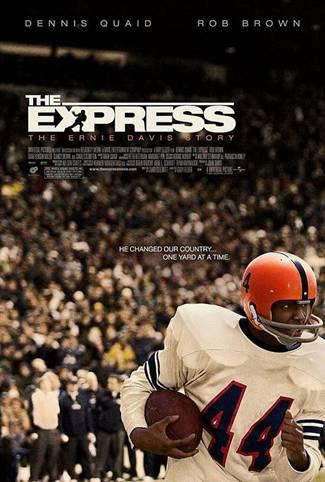 Courtesy of Universal Pictures
Courtesy of Universal PicturesInspired by a true story of the first African-American to win the much revered Heisman Trophy, this film not only follows the journey of a talented football player it emphasizes the conflict behind the civil revolution churning in our country that was on the brink of exploding.
The lead protagonist, Ernie Davis (Rob Brown), begins his journey as a stuttering, shy boy who needs a positive drive in his life. During the 1950s, the odds were mostly against African-Americans such as Davis because of the bigoted white culture across America that was continuously thwarting the efforts of the Civil Rights Movement. Young Davis found his muse in Hall of Famer Jackie Robinson, who sent Davis on a mission to athletic success and encouraged him to follow his dreams, but in the sport of football rather than baseball. Davis admired the baseball idol because of his ability to inspire others by merely doing what he loved and succeeding even though he was constantly struggling against racism. Davis was awed by Robinson because he was “a man doing a lot without sayin’ nothin’.”
The film flashes forward to Davis recruitment for the college football team at Syracuse University, a school needing to replace its star, Jim Brown. Now in the late “50s it was due time for this university to win a National Championship, as well as, this country to get past social discriminations and recognize the talent of all athletes, regardless of the color of their skin. The first few games proved that Ernie Davis was right where he was supposed to be: fighting on the football field for what he believed in.
But it wasn’t all a good time for the rookie player.
The head coach honored the young football star with Jim Brown’s well-known number 44 jersey. As if there wasn’t enough pressure being one of three black players on the team, he had to fill the shoes of a Syracuse legend. Moreover, the games were tough and the opposing teams were prejudiced.
Davis recognized that there was a racialized war in this country. It was a growing rift that was pressuring societal change, and it took place everywhere, including the football field.
Even though actor Rob Brown is a relative newcomer to film his performance as Ernie Davis, aka the “Elmira Express,” gave a heartwarming performance as the hopeful hero of the Syracuse football team.
The Syracuse head coach, Ben Schwartzwalder, played by the fatherly Dennis Quaid, was the serious yet sarcastic influence who pushed Ernie to strive for the top. Like any good coach, Quaid’s character gave Davis the brutal truth of the situation at hand. It seemed to be a constant struggle for Davis to give in to the social realities that surrounded him and to be truthful to himself and play no matter what others believed. Davis’ troubles were hardly over as the Syracuse team approached the 1960 Cotton Bowl game against Dallas. They were fighting racial intolerance as well as the Texas Longhorns.
As if the odds couldn’t get worse, Davis’s war was a binary battle against the non-believers of his skills in the stands, the prejudiced society outside the gates of the stadium and now against himself. In a country amidst a civil revolution, the importance of staying true to one’s self was an important battle for the football star to fight, even though it was full of trials and heartache. His battle on and off the field is a true testament to the extent that one must push to achieve the greatest success of all, the inner strength to conquer anything.
Distributed by: Univeral Pictures
Grade: A-



